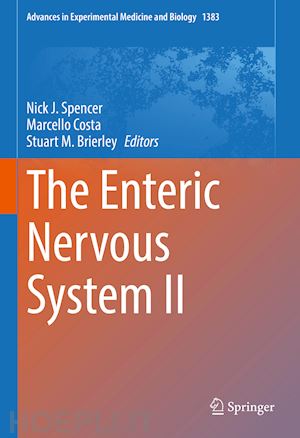
Questo prodotto usufruisce delle SPEDIZIONI GRATIS
selezionando l'opzione Corriere Veloce in fase di ordine.
Pagabile anche con Carta della cultura giovani e del merito, 18App Bonus Cultura e Carta del Docente
This book is based on the proceedings of the Enteric Nervous System conference in Adelaide, Australia, under the auspices of the International Federation for Neurogastroenterology and Motility. The book focuses on methodological strategies and unresolved issues in the field and explores where the future is heading and what technological advances have been made to address current and future questions. The Enteric Nervous System II continues in the tradition of a popular earlier volume which covered the previous meeting. Many of the same authors are contributing to this new volume, presenting state-of-the-art updates on the many developments in the field since the earlier meeting. The coverage include a wide range of topics, from structure and function of the enteric nervous system through gut motility and visceral pain. The author team includes long-established authorities who significantly contributed to the advances in ENS research over the past two decades and the new generation that will continue to contribute to advancing our understanding of the field.
Luminal Chemoreceptors and Intrinsic Nerves.- Key Modulators of Digestive Motor Function.- Comparative and evolutionary aspects of the ENS.- Exploring synaptic transmission in the ENS: electrophysiology, functional studies and modelling.- Mucosal Serotonin5.- Ca2+ signaling in Interstitial cells of Cajal: The mechanistic basis for many GI motility behaviors.- Identifying types of neurons in the enteric nervous systes.- Clinico-Pathological Features of severe gut dysmotility.- Purinergic signaling in the ENS.- Myogenic and neural control in concert.- colonic response to physiological and chemical stimuli.- Molecular targets to alleviate enteric neuropathy and gastrointestinal dysfunction.- The emerging role of the gut-brain microbiota axis in neurodevelopmental disorders.- A view on how enteric neurons monitor luminal content.- Interaction of the microbiota and the developing ENS.- Influence of the circadian rhythm on enteric nervous system function.- Mechanosensitive Enteric Neurons (MEN) at work.- Neurogenetic investigation of the ENS and gut motility.- The shaggy dog story of enteric signaling: serotonin, a molecular megillah.- Contribution of enteric neuroglial remodelling to inflammatory bowel disease and cancer evolution.- Examining cellular metabolism in the enteric nervous system.- Embryonic development of motility: a bottom-up approach to the workings of the intestine.- Quantitative analysis of intestinal movements with spatiotemporal maps.- The roles of Mas related G-protein coupled receptors in the gut.- Refining Enteric Neural Circuitry by Quantitative Morphology, Transcriptomics and Function in Mice”.- Extrinsic modulation of enteric circuits that regulate colon function in health and disease.- Activating and Modeling ENS Circuits in Mouse Colon.- Neurons, macrophages and glia: the role of intercellular communication for gut motility.- Modelling development of the ENS: What's been done and what's next.- Epithelial 5-HT4 receptors as a target for treating constipation and colitis.- Activity in Enteric Neural circuits underlying propulsion.- Contribution of the ENS to autoimmune diseases and irritable bowel syndrome.
Marcello Costa, PhD is Professor of Neurophysiology and Matthew Flinders Distinguished Professor in the College of Medicine and Public Health at Flinders Medical Centre in Adelaide, South Australia.











Il sito utilizza cookie ed altri strumenti di tracciamento che raccolgono informazioni dal dispositivo dell’utente. Oltre ai cookie tecnici ed analitici aggregati, strettamente necessari per il funzionamento di questo sito web, previo consenso dell’utente possono essere installati cookie di profilazione e marketing e cookie dei social media. Cliccando su “Accetto tutti i cookie” saranno attivate tutte le categorie di cookie. Per accettare solo deterninate categorie di cookie, cliccare invece su “Impostazioni cookie”. Chiudendo il banner o continuando a navigare saranno installati solo cookie tecnici. Per maggiori dettagli, consultare la Cookie Policy.